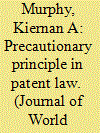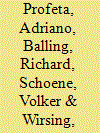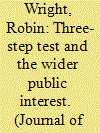| Srl | Item |
| 1 |
ID:
092457


|
|
|
|
|
| Publication |
2009.
|
| Summary/Abstract |
The Republic of Uganda is presently engaged, as many other developing countries, in reform of its intellectual property laws. The process raises a number of questions as to whether it addresses priorities besides the legal framework. What has prompted the reforms and what systems of innovation does the country have so as to harness the power of patents in enhancing Uganda's technological capacity? The article also challenges the philosophy and orthodoxy that underpins the basis for patent protection in facilitating the transfer of technology to developing countries and stimulating innovations. In particular, it is argued that patent legislation reform can be meaningful if it is met with marching reforms outside the ambit of the law.
|
|
|
|
|
|
|
|
|
|
|
|
|
|
|
|
| 2 |
ID:
092463


|
|
|
|
|
| Publication |
2009.
|
| Summary/Abstract |
The precautionary principle (PP) has rapidly emerged as a staple of international environmental law and attempts have been made to extend it into other fields. This article examines whether the PP can or should be extended into patent law. First, an assessment of the general arguments in favour of extending the PP into patent law is performed, followed by an analysis of its applicability within Canadian patent law as it is currently enacted. Then, the arguments against a precautionary patent law are scrutinized.
|
|
|
|
|
|
|
|
|
|
|
|
|
|
|
|
| 3 |
ID:
092461


|
|
|
|
|
| Publication |
2009.
|
| Summary/Abstract |
The protection of geographical indications for agricultural products and foodstuffs is one of the major pillars of the Common European Agricultural Policy and has become an important part of the transition from supporting commodity markets to enabling producers to market goods which satisfy consumer tastes. According to estimates, a total annual sales volume of approximately €14 bn is generated with protected geographical indications (PGI) and protected designations of origin (PDO). Nevertheless, the increase in utilization of the protection systems made obvious a number of problems in the practical application of the law. The Commission recognized these criticisms and announced a discussion on the regulation that was to commence officially in the autumn of 2008 with a Green Book about the PDO/PGI protection regime. In this context, the most recent problems are discussed and proposals are made that should be taken into account in order to accomplish the main goals of the regulation. Therefore this article is addressed to agricultural policy makers, consumer associations, as well as food producers and producer associations in Europe in order to provide a starting point for the Green Book debate.
|
|
|
|
|
|
|
|
|
|
|
|
|
|
|
|
| 4 |
ID:
092458


|
|
|
|
|
| Publication |
2009.
|
| Summary/Abstract |
Intellectual property law aims to protect the public interest in two often-contradictory ways: by granting exclusive rights to encourage creativity and by limiting those rights in certain situations for socially beneficial purposes. The Three-Step Test in international intellectual property treaties aims to ensure that limitations and exceptions to intellectual property rights do not inappropriately encroach upon the interests of rights holders. This article examines the interpretation of the Three-Step Test as included in the Agreement on Trade-Related Aspects of Intellectual Property Rights for copyright and patents by two World Trade Organization dispute-resolution panels and by other commentators. It looks at how these interpretations have dealt with the public policy motivations underlying limitations and exceptions to exclusive rights, and considers the ways in which the public policy intentions that underlie decisions by national legislators to adopt the limitations and exceptions to intellectual property rights can be considered in each step of the test. The conclusion reached is that the Three-Step Test contains the potential to allow both aspects of the public interest to be considered as part of an inclusive interpretation.
|
|
|
|
|
|
|
|
|
|
|
|
|
|
|
|